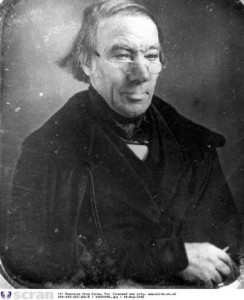 The somewhat strange-looking man on the left is Robert Owen. He’s the next major figure in my retrospective on how education changed in America.
The somewhat strange-looking man on the left is Robert Owen. He’s the next major figure in my retrospective on how education changed in America.
I’ve already noted that Unitarians sought to wrest control of education from orthodox Trinitarian Christians, but although they had some success in Massachusetts, they had little support in the rest of the nation.
Owen arrived in America from Britain as a believer in utopian communism. He was also a bitter foe of Christianity. Once here, he tried, in the 1820s, to set up his own little utopian community in Indiana, hopefully named New Harmony.
Well, it didn’t turn out to be very harmonious after all. Disputes arose, and the entire enterprise folded within two years. One of the problems Owens diagnosed with his attempt was that Americans were not too amenable with the idea that they couldn’t own private property.
What to do with this dilemma?
Owen’s answer was to set up a political party, dubbed the Workingmen’s Party, in an effort to gain political power so that his people might be able to establish government-controlled schools. In those schools, at least in theory, these Owenites would then train students into the communist worldview and rip the desire to own property from their impressionable minds. All of this, interestingly, was prior to Karl Marx’s activities in Europe. Marx simply provided his own unique type of communism.
Robert Owens never achieved his goal, but his Workingmen’s Party did make a dent politically, particularly in New York. One of his adherents later defected and became a Christian. He then penned some rather direct comments regarding the aims of this political party. I’ll relate those in the next education post.
